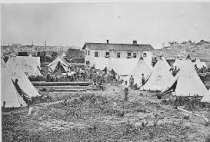
As Ulysses S. Grant’s army entered West Tennessee, hordes of hungry fugitive slaves, or contrabands, surrounded them. Grant ordered Chaplain John Eaton to establish a camp for the fugitives, who had supplied forced labor for the Confederate army.
During the Civil War, significant numbers of Tennessee's 275,000 slaves abandoned farms and towns at news of the Union Army’s approach. In the summer of 1862, as General Ulysses S. Grant’s army entered slaveholding territory in West Tennessee, hordes of hungry and poorly clad fugitive slaves surrounded them. Grant ordered Chaplain John Eaton to requisition surplus tents, blankets, rations, and tools to establish a camp for the fugitives, who had been supplying forced labor for the Confederate army as teamsters, construction laborers, and body servants. Runaway slaves were considered contraband property under the Confiscation Act—thus the name “contraband” camps. Eaton established the first contraband camp at Grand Junction in August 1862. By March 1863, contrabands at Grand Junction numbered 1,713. Two years later, camps stretched throughout occupied parts of the Mississippi Valley. In late 1862, northern missionaries and church leaders arrived to establish schools, offer religious and medical services, and even provide political education for contrabands. The army put able freedmen to work at 50 cents per day on abandoned farms, government-supervised plantations, and military projects. Filled with log cabins, frame buildings, and often tents with dirt floors, the camps became so large that northern missionaries and local newspapers often referred to them as "New Africa." The large camps on Memphis's southern boundary were called Camp Shiloh and Camp Fiske (near Union Fort Pickering) and Camp Dixie (President's Island). Camp Shiloh had over 300 houses and 2,000 residents, churches, schools, saloons, lunchrooms, and barbershops. The contrabands in Camp Dixie cultivated 300 acres of cotton, and built a sawmill and school in 1863. Many of the soldiers who manned Fort Pickering anxiously watched over the parapets for their families at Camp Shiloh. In Nashville, the camps were located south (Edgehill), west (Northwest Camp), and east (Edgefield) of the city's boundaries. Between December 1863 and December 1864, when the Union army temporarily lost some areas to invading Confederate armies, contrabands from small towns were sent on railroad cars to Memphis, Nashville, and Chattanooga. More than 1,600 contrabands transferred from Holly Springs and Corinth, Mississippi, to Memphis's Camp Chelsea.
Tools
Key Facts
- Runaway slaves were considered “contraband” property under the Confiscation Act
- Eaton established the first camp at Grand Junction
- Church leaders provided schools, religious and medical services
- Contrabands worked on farms or for the Union army




